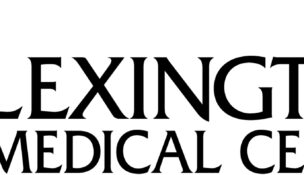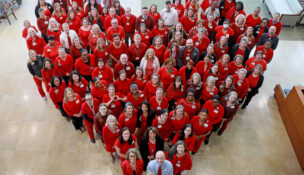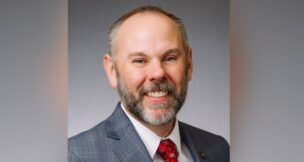Medical merger moves forward despite questions
Melinda Waldrop //March 14, 2018//
Although some questions linger, the two men leading the partnership formed by Palmetto Health and Greenville Health System say the new relationship is working out better than imagined.
“I certainly figured that Chuck and I would be able to tolerate each other for a while, but it’s more than that,” said Michael Riordan, co-CEO along with Charles Beaman Jr. of SC Health Company. “It’s just been a great experience for me. I jokingly say I can’t wait till we have our first fight. Our different approaches but shared common vision and purpose and commitment – you can’t fake that. It’s genuine, and I think it’s going to be a differentiator for us as we move forward.”
SC Health Company is the working name of the partnership formed in late November 2017 between Palmetto Health, the largest health care system in the Midlands, and GHS, the largest nonprofit health care delivery system in the state. Combined, the two companies have 1.2 million patients a year, $3.9 billion in annual revenue and more than 28,000 employees covering half the state.
The Palmetto Health system includes Palmetto Health Richland, Palmetto Health Baptist and Palmetto Health Baptist Parkridge in Columbia and Palmetto Health Tuomey in Sumter. GHS has facilities in Greenville, Oconee and Laurens counties and the city of Greer, and the two companies have co-owned Easley Baptist Hospital in Pickens County since 2009.
The road to partnership hasn’t been completely smooth, however. In January, S.C. Gov. Henry McMaster denied approval of SC Health Company’s $1.5 billion debt restructuring plan, and last month, Upstate legislators, already upset by GHS’ switch from a public to a private nonprofit in 2015, responded to the merger with Palmetto Health with a bill proposing the sale of GHS.
Greenville County Council tabled the debt consolidation issue in late 2017 over concerns about debt being passed on to local patients, as well as uncertainty surrounding a lawsuit brought after GHS’ change to a private nonprofit that is still pending in Greenville’s 13th Circuit Court.
“There is an existing lawsuit, and there is legislation that is still pending,” said Riordan, who served as president and CEO of GHS for 10 years after joining the organization in 2006. “Even though it has been amended in the Senate to take out the sale bill, it still is pending in the House. There has been some positive recent movement with regard to that, but that idea or that legislation is still out there. We are going to certainly continue to get our message out that we think (a sale) is not a good idea for lots of reasons, and we think that will get resolved.”
Beaman, the founding president of Palmetto Health since its 1998 inception who was appointed CEO of the organization in 2007, said SC Health Company is reworking its debt restructuring plan to win necessary state approval.
“There’s a plan A and a plan B, and in any case, we will be positioned to do whatever refinancing we have to do, whether it’s a bridge loan of some type or whether it’s refinancing bonds,” Beaman said. “We’re working on that and don’t have a whole lot more to say on that, other than we have a very active plan that will be successful.”
The original plan would have consolidated the debt – more than $860 million of it from Palmetto Health – in bonds, taking advantage of lower interest rates than when the bonds were originally issued to save up to $100 million in interest payments. McMaster said in a Dec. 29 letter that he was concerned about spreading debt across Greenville and Oconee counties when those county councils have not agreed to the plan. Issues surrounding the restructuring need to be resolved within those counties, McMaster said.
“I’m sensing a tone of the hurdle is the Greenville County Council, and there certainly has been recently a willingness on their part to better understand the positive components of this,” Riordan said. “I actually am encouraged by some of those recent conversations. … The majority of county council has been and continues to be very supportive. There were several on the fringes that sort of wanted to take a wait-and-see (approach). Greenville County didn’t say no. They tabled it to get information.”
TAKING A NEW SHAPE
The partnership has forged ahead, seating a 14-member board, including Riordan and Beaman, and touting the advantages its combined resources can provide.
“We have identified opportunities across both organizations of how we can improve outcomes, (and) we’re beginning to implement some of those ideas,” Beaman said. “The ability and the enthusiasm around clinical outcomes has been really encouraging. As physicians begin to work and interface with each other in both communities and learn what’s working well and trying to figure out how we can adopt that quickly – those are all things that are building blocks for accelerating outcomes and improvement.”
The board includes chief of staff Michael Hildebrand, who has been with GHS for four years; chief governance officer Joseph Blake Jr., the former vice president and chief legal officer of the GHS Strategic Coordinating Organization; and chief strategy officer Malcolm Isley, who held a similar position at GHS. CFO Terri Newsom is a six-year GHS veteran, while chief administrative officer Gregory Rusnak has been with GHS for 21 years. Chief clinical officer Angelo Sinopoli has worked for GHS for 30 years.
General counsel Howard West served as chief legal officer for Palmetto Health, where he has worked for nearly 39 years. The board also includes John Singerling, president of the Palmetto Health/Midlands Affiliate, and Spence Taylor, president of the Greenville Health System/Upstate Affiliate.
Board chair James Wheeler, vice president of M-D MetalSource in Columbia, was previously the chair of the boards of both Palmetto Health and Palmetto Tuomey. Vice chair Michelle Seaver, president of United Community Bank for Greenville County, has served on the board of GHS’ Women’s Advisory Council.
“The process to get on the board has been an equal process,” Beaman said. “The members of the board have perspectives from their geographic area and their institution in the past, but it was not designed, and the board has never been designed, to come together to only protect the interests of the corporations they represent. It’s to really look at only SCHC and its well-being. … I feel like there’s one board. I don’t feel like I’m talking to someone from a GHS perspective or someone from a Palmetto Health perspective. I think we all are talking from perspective of the SC Health Company.”
The leadership of the new company will maintain both partners’ traditions of research and strong academic ties to tackle the myriad challenges, including heart disease, diabetes, stroke and obesity, of a state that ranked 44th in America’s Health Rankings Annual Report in 2017.
In talking with representatives from both organizations about the merger, “the thing that got them more excited than anything else dealt with the fact that we need to move outcomes for South Carolinians from 44th in the country way up,” Riordan said. “That was what got them excited, and the belief that our combined resources would be able to make a bigger impact on that. That outstripped anything that we were going to do in terms of saving dollars or a better budget or a better strategy. It was the outcomes for South Carolina.”
SC Health Company has created a nursing council, Riordan said, and the organization continues to seek input from members of its staff as it forms a strategy for its future.
“Just by virtue of how much we buy, we can get things less expensive. We can do things less expensive,” Riordan said. “We really believe we’re going to bring a value proposition back to the organizations and ultimately back to the patients. Neither of our organizations have historically been high-margin organizations. We take those dollars, and between the two of us, we’ve probably put 700 or 800 million dollars back into our communities, and that’s going to continue. That’s really important to us.”
It’s also crucial that individual patients know they have a place in the expansive partnership, Beaman said.
“Organizations can become large. They can become complex. What we do not want to ever forget is the individual impact we can have on people,” Beaman said. “The focus has always been on how can we do a better job in serving the health care needs of the people in our communities, and that, to us, is only going to improve over time.
“It really boils down to that individual encounter. What do I need from a health system? How can I access the health system? And when I do access it, what’s the experience I have when I go through it? We want that experience to meet the needs of the people, but it’s got to be good enough that it’s good for your parents. It’s got to be good for your spouse. It’s got to be good for your friends. It’s got to be good for your children. It’s got to be good for yourself, and that’s because of the quality. It’s because of the experience, and it’s because of the connectivity that our providers have with people on an individual basis.”
This story first appeared in the March 12 print edition of the Columbia Regional Business Report.
e















